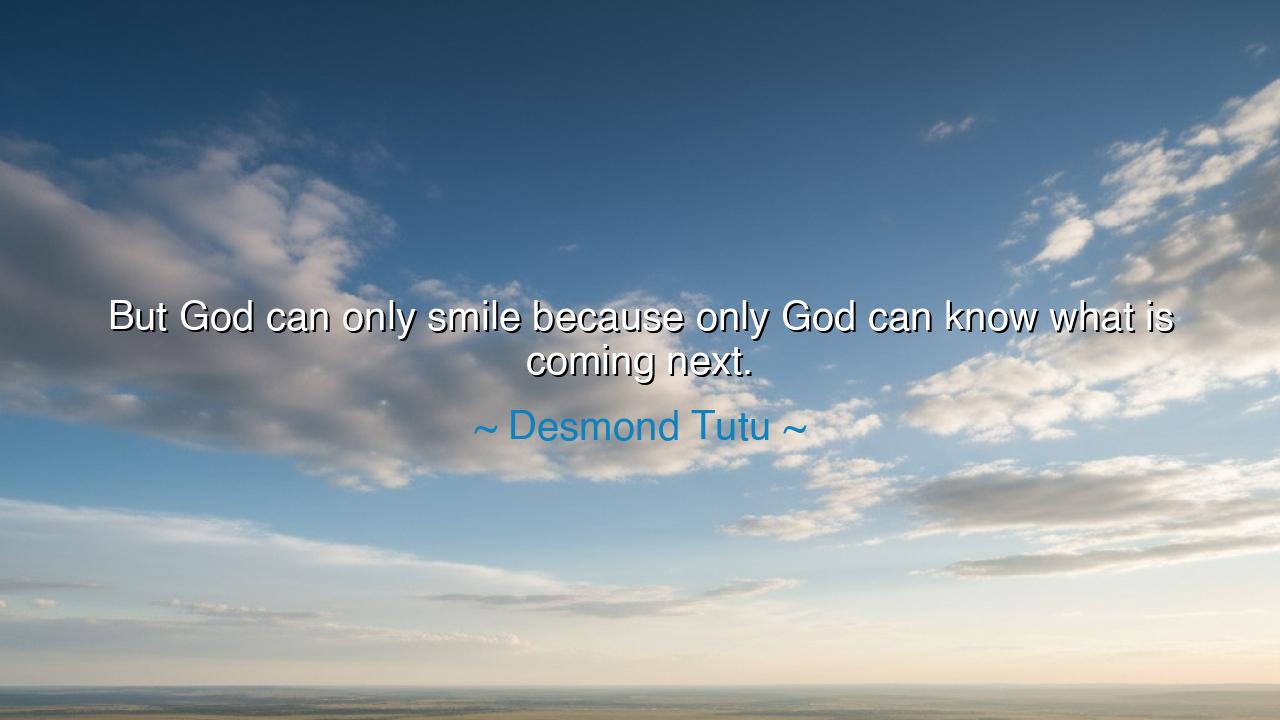
But God can only smile because only God can know what is coming






Hear the voice of Archbishop Desmond Tutu, prophet of peace and laughter amidst suffering, who declared: “But God can only smile because only God can know what is coming next.” In these words lies a mystery of both faith and joy—the recognition that human beings live in uncertainty, bound by fear of tomorrow, while the Eternal One sees the whole design. To God, the unfolding of history is not chaos, but harmony; not despair, but hope. Thus, where mortals tremble, God can smile, for He knows the end even from the beginning.
The ancients, too, sought to understand this paradox. They wrote of the gods who looked upon human struggles with serenity, not because they were indifferent, but because they held knowledge beyond the grasp of men. The weaver sees the full tapestry while the thread only knows its own knot. And so it is with God’s smile—to us it may seem strange amidst hardship, but it is born of certainty that even in sorrow there lies the seed of redemption, even in ruin the root of renewal.
Consider the story of Nelson Mandela, Tutu’s companion in the struggle against apartheid. For twenty-seven years he endured the iron chains of prison. To the world, his fate seemed sealed in despair. Yet when he walked free, his first words and gestures were not of vengeance but reconciliation. It was as if a divine smile had hovered unseen over those decades, knowing that the prisoner would one day become the liberator, that the darkness of apartheid would yield to dawn. Only God, who knew what was to come, could smile through those long years of night.
The truth of Tutu’s words resounds in history’s many turns. When the Berlin Wall rose, it seemed eternal, a symbol of division carved into stone. Yet within a single night it fell, and the world awakened to a new order. To men, it was shocking; to God, who alone knew the next chapter, it was but the appointed moment. Thus, while nations trembled, God could smile, for He already knew the collapse of tyranny was written in the scroll of time.
The meaning of the quote is clear: the smile of God is not mockery, but assurance. It is the smile of one who sees beyond our blindness, who knows that despair is never the final word. Humanity frets at the unknown, fearing loss, defeat, and death. But God smiles because He knows of the victories yet unseen, the mercies yet to come, the triumphs that lie hidden beyond the veil of tomorrow. Where we see endings, He sees beginnings. Where we see chaos, He sees the unfolding of His eternal design.
The lesson for us is profound: trust the smile of God. Do not let the uncertainty of life turn your heart to bitterness or fear. Though you cannot know what tomorrow brings, you can walk with courage, for the Eternal One does. Your part is not to know the whole, but to live faithfully in the moment, with love, justice, and hope. The future is not in your keeping, and that is why you must not despair—it rests in wiser hands.
Practical action flows easily: when hardship strikes, resist the urge to believe it is the end. Instead, hold to faith that there is more yet to come. In moments of fear, choose to act with hope, even when evidence seems scarce. When others despair, remind them of the greater design that only God can see. Let your life become a reflection of that divine smile—a calmness, a joy, a strength that reassures others that no shadow is permanent, and no night without its dawn.
Thus, Tutu’s words echo across the ages: “But God can only smile because only God can know what is coming next.” Take them as a hymn of courage. For though you cannot see the horizon, the Almighty has already walked beyond it. And if God smiles, then so may you—for the story is not finished, and its ending is written in light.






AAdministratorAdministrator
Welcome, honored guests. Please leave a comment, we will respond soon